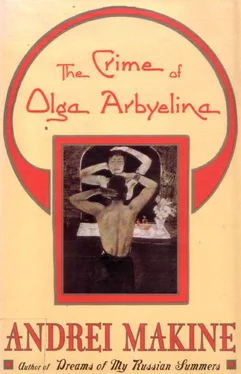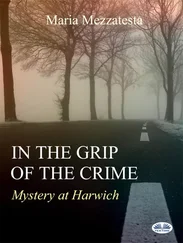The figure that appeared at the other end of the footpath was that of the postman. He brought a telegram signed "L.M.," offering a choice of two dates for their next meeting. She went indoors and read the few impersonal words a second time. The dates seemed to her as fantastic as the months of the French revolutionary calendar- all those "nivôses" and "pluviôses," very evocative, but from a completely different era. Paris, a gray morning; a man scraping the soles of his shoes on the edge of the sidewalk before getting into his car… "So all of that is still going on somewhere," she told herself, feeling as if she were recalling a life she had abandoned ten years before. The man was still walking about in that busy, humid Paris that smelled of the smoky warmth of cafés, the sweatiness of the Metro. He went to his editorial offices, argued, gesticulated, talked on the telephone, and every evening made his typewriter vibrate with the dry and nervous drumming of his fingers. Then he looked in his calendar and chose these two dates that were still free and sent a telegram…
When she went out again a few minutes later to go to the Caravanserai, the luminosity of the air, the shadows, the branches, the sky, the smell of the cold had imperceptibly reshaped the equilibrium that had linked them a moment ago. She felt this change very intimately. As if she were taking part in the transition from one tonality to another, physically, within her own body.
In the immobility of that winter weather there was one day when, precisely because of these tonalities, she sensed that her son would come to her…
That night the wind howled noisily in the chimney, making the fire blaze in the stove. Sometimes the flames died back, cowed; sometimes they swelled and thrust fine blue tongues out through the chink of the cast iron door. Then suddenly the absence of noise would be deafening, as if the house, snatched up by a squall, were already floating through the night, far from the earth in a soundless, black transparency. The flickering of the candle grew still, and fixed the shadows on the walls of the bedroom. The fire was silent. The scent of burning wood gave contours to the darkness that were invisible but could be perceived if you closed your eyes and inhaled deeply.
Thus it was, her eyes half closed, her breathing intoxicated, that she abandoned herself to this fresh moment of silence… A minute earlier, seeing the sections of a thick branch stacked beside the stove, she had said to herself that this meager firewood would be just enough to give her the illusion, at the start of the night, of going to sleep in a house that was inhabited. She had shivered, picturing herself waking up, well before dawn, in a room smelling of dead, icy smoke… But now even this branch and the fragments of mossy bark scattered on the floor gave off an indefinable happiness. There was, she felt, an unknown joy in the roughness of this bark, in the scented acidity of the smoke, in the thunderous rage of the wind, and in this silence as perfect as the shape of the motionless candle flame… She crouched down, put a part of the branch in the fire, and arranged the rest of the wood carefully beside the stove. A scrap of bark could have cracked beneath the foot of someone walking in the dark…
She knew he would come that night. Everything proclaimed it.
In the kitchen she saw a slight trace of white on the brown surface of the infusion, emptied it into the sink, and went out. Coming back into her bedroom she hesitated for a second, then thrust another scrap of the branch into the depths of the stove.
It was his going, always abrupt, as if running away, that broke the night. The moment was shattered. Taking fright, the body vanished beneath the flaps of the overcoat; the feet, in a ballet of lightning movements, avoided the floorboards booby-trapped with creaks… He stopped on the threshold of the room, returned toward the stove with the same tightrope walker's nimbleness, seized the last piece of the branch, almost threw it into the embers, then decided not to, put the wood down, glanced at the bed, crossed the room, and vanished behind the door as it cautiously slid to.
She waited for a long while without any notion of hours or minutes. Then got up, put the rest of the wood in among the barely flickering flames, and got back into bed. Her reverie, that veered between vigil and dream, lasted through the revival, then the dying of the fire. The whole night was condensed into the unique sensation that hasty visit had left her with; the chilled young body, with warmth flooding into it, first the fingers, a little later the lips, the arm that lay for a moment across her shoulder, her breast… The memory of it, still fresh, could be inhaled, like the scent of the fire, like the gusts of icy air that spilled into the room with each squall.
She had to get up again in the dark. The cold was becoming unbearable. It was as if it were lurking in her clothes; they felt stiff and seemed shrunken. The rough sides of the stove no longer retained a spark of life… Outside the wind had died down, or rather it had risen far above the earth and was driving the clouds along at an unusual height in a rapid, spellbinding flight. From time to time their billowing was swollen with a milky pallor, the moon appeared, then a star, both immediately hidden again. In this shifting gloom she crossed the meadow, a creaking carapace of hardened snow. She found nothing. Everything that could be burned had long since been gathered up by the inhabitants of the Caravanserai… She went toward the wood and after a long, vain trawl, wrenched a twisted branch out of the snow-derisory when she pictured the flames that would only last a few minutes on these little sticks. She straightened up, her head buzzing, her eyes confused with the effort. The vision forming in her eyes was wholly inward: a house tacked on to the wall of a somber, half inhabited building, a winter night, infinite isolation; and in the very depths of this solitude, a room, the silent life of a fire. And this couple, a woman sunk in a sleep more unshakable than a lethargy and a youth with slow movements and a dazzled look, himself surprised by the magic of his crime… A mother and her son.
"So I'm mad," she said to herself with calm resignation, studying the pieces of the branch she had just broken up. Her gaze strayed between the dark trunks around her, into the thickets burdened with snow, and then soared up toward the tops of the trees. She saw that over its whole nocturnal expanse the sky had cleared. The last clouds, in a wispy procession, seemed to be streaming vertically away from the earth, as if attracted by the moon, and disappearing into its faintly iridescent halo.
It was then, with her gaze focused on that ascending flight, that she pictured the whole earth, the globe, the world peopled by men. Yes, all those men talking, smiling, weeping, embracing one another, praying to their gods, killing millions of their fellows, and, just as if nothing had happened, continuing to love one another, pray, and hope, before crossing through the fine layer of earth that separated all that ferment from the immobility of the dead.
The words she heard herself whispering surprised her less than the little cloud of her breath shining in a moonbeam: "They are the ones living in complete madness. They, down there, on their globe…" She stooped and began to pick up the pieces of the broken branch… Beyond the last trees in the wood she saw the house: the moon appeared around the wall of the Caravanserai, shone down on the snow-covered front steps, and turned one of the windows blue. She still saw it from that distant perspective, toppling down from the vertical flight of the clouds. Still saw the planet as a whole and on the dark, nocturnal side of it a long dwelling, leaned up against a wall. And that couple forgotten by the world. A woman and a youth. A mother and her son… A slight cloud arose from her lips once more. The murmur of her words melted into the frozen air… A strange couple. A youth who will die. His last winter, perhaps. Last spring. He thinks about it. And the woman's body that he loves, the first body in his life. And the last…
Читать дальше












